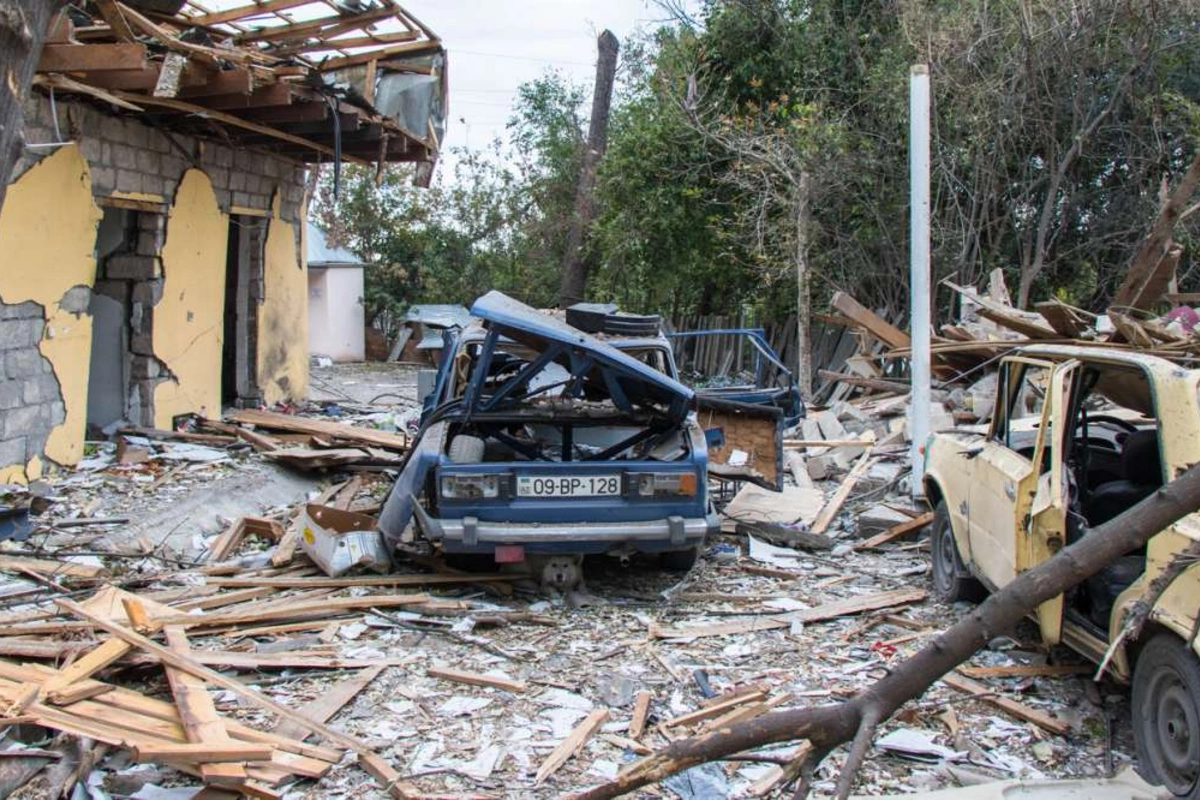
Azerbaijan, Armenia
What’s left of one home’s courtyard/driveway in Tartar, Azerbaijan, after rocket fire from Armenian forces. October 10, 2020. Image: Nurlan Mammadzada/Shutterstock
The French always have a word for things. This phrase – la politique du pire – has four words, but the old expression captures one idea. If one keeps making things worse - even intolerable - for an opponent, something useful might eventually come out of it. The idea is to create a crisis where the object of such a strategy over-reacts, giving the perpetrator moral high ground. The example we studied in university was Algeria, where acts of terrorism led to such a violent reaction by the French Army that it ended up being public outcry, especially in France, that led to Algerian independence.
The list of people and places where this strategy has appeared is long. I first came across it in my studies of insurgency and counterinsurgency back in the 1980s. Malaya. Algeria. Vietnam. Kenya. Mozambique. Ireland, and of course, the Middle East. European colonial powers became familiar with the strategy. To the zealous, it has seductive appeal. That is the problem with its bleak logic. It lends itself to cycles of violence and war.
As far as I know, other Canadians, much like myself, do not like this strategy. They have done considerable soul-searching about trying to keep the peace or make peace. We’ve seen too many places that grow graves among lush vegetation or – as in Afghanistan – are so desolate from war that our soldiers stood on ancient heaps of dried bones from long-forgotten battles. Canadian humanitarianism continues, but the illusions are mostly gone, at least for now. When Canadians packed up and left Kandahar, they exhibited a pragmatism which some would say was long overdue. To say it has been worth it requires a considerable act of faith.
So, when I look at the Caspian region over the past spring and summer, I have little militant idealism. Over the Karabakh conflict, the North American press often seems pro-Armenian. But to Canadians like me who are not of Armenian descent, the situation looks more straightforward. Azerbaijan has regained Nagorno-Karabakh and makes a case that this accords with UN Resolutions 822, 853, 874 and 884. Do we then detect la politique du pire in Armenia’s persistent efforts ever since, by diplomacy, and by firing far too many shots across the (still undefined) border to get something started again? An interesting but undisclosed statistic would be how many of these shots, scouting excursions, and surreptitious mine-layings have been lethal. Will they be allowed to continue? Or will they provoke the over-reaction that they appear determined to create?
Canadians might say what is needed is some Armenian soul-searching. To be fair, Armenia seems to have done some necessary reining-in of its security forces on the border. Still, some of their former leaders insist that the fight must continue. In a recent article, Vartan Oskanian, former Armenian Foreign Affairs Minister, swears Karabakh will not be let go without a diplomatic fight through the Minsk Group forum. He writes that Armenia must push the US, EU and even Russia (who stood aside in 2020) to oppose the Azerbaijani claim to Karabakh, fearing that a settlement based on the November 9 document will end the ancient struggle. Oskanian fears that Azerbaijan will “impose its will” on Karabakh and that the world will accept what he calls the “stereotypical” view that Azerbaijan has finally taken back what was taken away in the 1990s. The irony, one hopes, is unconscious but obvious.
Until the recent Armenian election, it was feared that Nikol Pashinyan’s attempts to negotiate with Azerbaijan could result in the fall of Armenia’s comparatively moderate prime minister. However, his restraint is not matched by either Oskanian or his other many critics, who demand Armenia’s recovery of Karabakh (called ‘Artsakh’ to Armenians). Oskanian has made it clear that de jure possession still is the aim of his group, writing in his article that for “all Armenian administrations, …the final goal has always been that at the end, one day, Artsakh will return to Armenia, de jure.” So “Artsakh self-determination” remains something of a diplomatic fig-leaf. Another fig leaf might be his claim that Armenian military action will be of secondary importance.
“Politique du pire” thrives on fig leaves. And provocations. It withers when those tempted by it use restraint, the kind that Pashinyan and his government seem to be exercising of late.
But a spoiler strategy still could be to talk until the fig leaves turn brown, paralyzing post-war reconstruction. Frustrations too easily create the fertile ground for provocations. Typically, when little incitements fail, big ones usually follow until something unforgivable takes place. Then, when the dust settles, people have died, and the land is left desolate. One hopes Armenians and Azerbaijanis have tired of this cycle. Perhaps pragmatism, and peace, can be the fruit of dead and dying fig leaves in the old garden of “Politique du pire.”
Share on social media